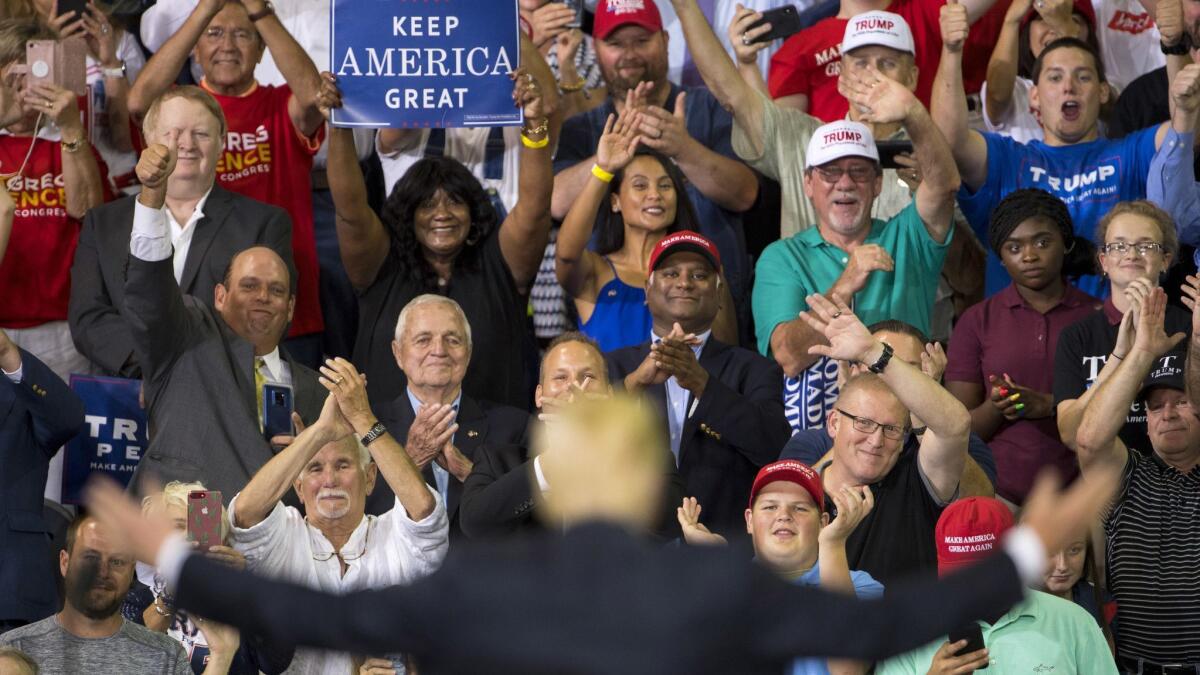Editorial: The paradox of rising globalism fueling rising nationalism

If there is one inarguable truth about the state of the modern world, it’s that industries and national economies have become so globalized that there is no turning back, no matter how many tariffs President Trump slaps on imports or how hard he tries to rewrite trade deals. But there’s another inarguable truth, too. The advanced nations of the world did not fully anticipate and address the economic pain of workers whose jobs have disappeared as production has migrated to other countries to take advantage of lower labor costs or move closer to foreign markets. And so, somewhat incongruously, increased globalization has helped propel the rise of protectionist nationalism, particularly here in the U.S. and in Europe, which could lead to a more fractious, and thus more dangerous, world.
Free trade and the globalized economy have been especially good for some corporations and developing nations, but not so good for the working and middle classes of some developed nations or the people living outside population centers who don’t work in export-friendly businesses. While American economic energy and people have consolidated in large metro areas mainly in the coastal states, many rural areas and smaller interior cities have suffered, leading to geographic and class resentments.
If nations are to flourish in this globalized world, they will need to find ways to lessen the economic damage from globalization.
Donald Trump tapped into that well of populism to win the White House, and neo-nationalists have done similarly in Europe. Great Britain’s vote to withdraw from the European Union relied on similar dissatisfactions. Residents of Scotland and British urban areas voted against Brexit, but not in sufficient numbers to counter the strong support in rural areas and small towns.
But there’s more involved than economics and the rural-urban divide. Brexit supporters were driven largely by resentment toward immigrants, and western Europe has been grappling with a huge influx of refugees from the Middle East and Africa as wars, political instability and sputtering economies have put torrents of people on the move.
Since 2014, the United Nations High Commissioner for Refugees reports, more than 1.8 million mostly Middle Eastern and African migrants have arrived in Europe by sea. That influx has fueled complaints by some conservatives who claim it is changing the nature of Europe itself, and it’s giving political support to nationalist parties in France, Hungary, Poland and Italy.
The U.S. has its own long-running debate over immigration control even as the total number of people living here illegally has dropped over the past decade. The dramatic flow of unaccompanied minors and families fleeing Central American violence has reinvigorated anti-immigrant hardliners, though a growing number of Americans say they believe the nation needs more legal immigration.
In many ways, the rise of ethnic nationalism stems from fears of lost identity. The demagogues fueling and feeding off this instability want, as Trump put it, to make their nations great again. That’s usually defined by reverting to some previous and usually romanticized state of ethnic dominance. Some white Americans fear the “browning of the nation” and its implied cultural shifts; Marine Le Pen, the face of French right-wing nationalism, wants “France for the French,” and Hungarian Prime Minister Viktor Orban has won success by framing his country as the last bastion against the Islamization of Europe. According to Orban, neighboring nations’ acceptance of immigrants “opened the way for the decline of Christian culture and … Islamic expansion.”
Enter the Fray: First takes on the news of the minute from L.A. Times Opinion »
It is that sort of economic and cultural anxiety that threatens to undo the post-World War II order of liberal democracy and the belief that individual freedoms must be protected in pluralistic societies. If nations are to flourish in this globalized world, they will need to find ways to lessen the economic damage from globalization and to counter the fears of cultural change. They also need to make a stronger defense of liberal institutions such as independent judiciaries and a free press, reduce vitriol and ostracization in public discourse, and better integrate rural areas with the national economy (improving rural internet access and hiring more people to work remotely would be a start).
Ultimately the nations of the world need to recognize that while there is mutual advantage to globalization, localized damage must be addressed without foisting undeserved blame onto immigrants or minority cultures within nations. The world has seen where toxic nationalism has led in the past — to devastating wars, in fact — and cannot countenance its rise now. A world of walls can be a dangerous place.
Follow the Opinion section on Twitter @latimesopinion or Facebook
More to Read
A cure for the common opinion
Get thought-provoking perspectives with our weekly newsletter.
You may occasionally receive promotional content from the Los Angeles Times.










